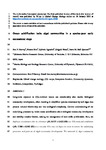Ocean acidification locks algal communities in a species‐poor early successional stage
| dc.contributor.author | Harvey, BP | |
| dc.contributor.author | Kon, K | |
| dc.contributor.author | Agostini, S | |
| dc.contributor.author | Wada, S | |
| dc.contributor.author | Hall‐Spencer, JM | |
| dc.date.accessioned | 2021-01-27T12:00:07Z | |
| dc.date.issued | 2021-01-10 | |
| dc.identifier.issn | 1354-1013 | |
| dc.identifier.issn | 1365-2486 | |
| dc.identifier.other | gcb.15455 | |
| dc.identifier.uri | http://hdl.handle.net/10026.1/16821 | |
| dc.description.abstract |
<jats:title> <jats:styled-content style="fixed-case">Abstract</jats:styled-content> </jats:title><jats:p>Long‐term exposure to CO<jats:sub>2</jats:sub>‐enriched waters can considerably alter marine biological community development, often resulting in simplified systems dominated by turf algae that possess reduced biodiversity and low ecological complexity. Current understanding of the underlying processes by which ocean acidification alters biological community development and stability remains limited, making the management of such shifts problematic. Here, we deployed recruitment tiles in reference (pH<jats:sub>T</jats:sub> 8.137 ± 0.056 SD) and CO<jats:sub>2</jats:sub>‐enriched conditions (pH<jats:sub>T</jats:sub> 7.788 ± 0.105 SD) at a volcanic CO<jats:sub>2</jats:sub> seep in Japan to assess the underlying processes and patterns of algal community development. We assessed (i) algal community succession in two different seasons (Cooler months: January–July, and warmer months: July–January), (ii) the effects of initial community composition on subsequent community succession (by reciprocally transplanting preestablished communities for a further 6 months), and (iii) the community production of resulting communities, to assess how their functioning was altered (following 12 months recruitment). Settlement tiles became dominated by turf algae under CO<jats:sub>2</jats:sub>‐enrichment and had lower biomass, diversity and complexity, a pattern consistent across seasons. This locked the community in a species‐poor early successional stage. In terms of community functioning, the elevated <jats:italic>p</jats:italic>CO<jats:sub>2</jats:sub> community had greater net community production, but this did not result in increased algal community cover, biomass, biodiversity or structural complexity. Taken together, this shows that both new and established communities become simplified by rising CO<jats:sub>2</jats:sub> levels. Our transplant of preestablished communities from enriched CO<jats:sub>2</jats:sub> to reference conditions demonstrated their high resilience, since they became indistinguishable from communities maintained entirely in reference conditions. This shows that meaningful reductions in <jats:italic>p</jats:italic>CO<jats:sub>2</jats:sub> can enable the recovery of algal communities. By understanding the ecological processes responsible for driving shifts in community composition, we can better assess how communities are likely to be altered by ocean acidification.</jats:p> | |
| dc.format.extent | 2174-2187 | |
| dc.format.medium | Print-Electronic | |
| dc.language | en | |
| dc.language.iso | en | |
| dc.publisher | Wiley | |
| dc.subject | CO2 seeps | |
| dc.subject | community dynamics | |
| dc.subject | competition | |
| dc.subject | ecosystem function | |
| dc.subject | global change ecology | |
| dc.subject | inhibition | |
| dc.subject | turf algae | |
| dc.title | Ocean acidification locks algal communities in a species‐poor early successional stage | |
| dc.type | journal-article | |
| dc.type | Journal Article | |
| plymouth.author-url | https://www.webofscience.com/api/gateway?GWVersion=2&SrcApp=PARTNER_APP&SrcAuth=LinksAMR&KeyUT=WOS:000606348400001&DestLinkType=FullRecord&DestApp=ALL_WOS&UsrCustomerID=11bb513d99f797142bcfeffcc58ea008 | |
| plymouth.issue | 10 | |
| plymouth.volume | 27 | |
| plymouth.publication-status | Published | |
| plymouth.journal | Global Change Biology | |
| dc.identifier.doi | 10.1111/gcb.15455 | |
| plymouth.organisational-group | /Plymouth | |
| plymouth.organisational-group | /Plymouth/Faculty of Science and Engineering | |
| plymouth.organisational-group | /Plymouth/Faculty of Science and Engineering/School of Biological and Marine Sciences | |
| plymouth.organisational-group | /Plymouth/PRIMaRE Publications | |
| plymouth.organisational-group | /Plymouth/REF 2021 Researchers by UoA | |
| plymouth.organisational-group | /Plymouth/REF 2021 Researchers by UoA/UoA07 Earth Systems and Environmental Sciences | |
| plymouth.organisational-group | /Plymouth/Research Groups | |
| plymouth.organisational-group | /Plymouth/Research Groups/Marine Institute | |
| plymouth.organisational-group | /Plymouth/Users by role | |
| plymouth.organisational-group | /Plymouth/Users by role/Academics | |
| dc.publisher.place | England | |
| dcterms.dateAccepted | 2020-11-13 | |
| dc.rights.embargodate | 2022-1-10 | |
| dc.identifier.eissn | 1365-2486 | |
| dc.rights.embargoperiod | Not known | |
| rioxxterms.funder | Japan Society for the Promotion of Science | |
| rioxxterms.identifier.project | JSPS KAKENHI | |
| rioxxterms.versionofrecord | 10.1111/gcb.15455 | |
| rioxxterms.licenseref.uri | http://www.rioxx.net/licenses/all-rights-reserved | |
| rioxxterms.licenseref.startdate | 2021-01-10 | |
| rioxxterms.type | Journal Article/Review | |
| plymouth.funder | JSPS KAKENHI::Japan Society for the Promotion of Science |


